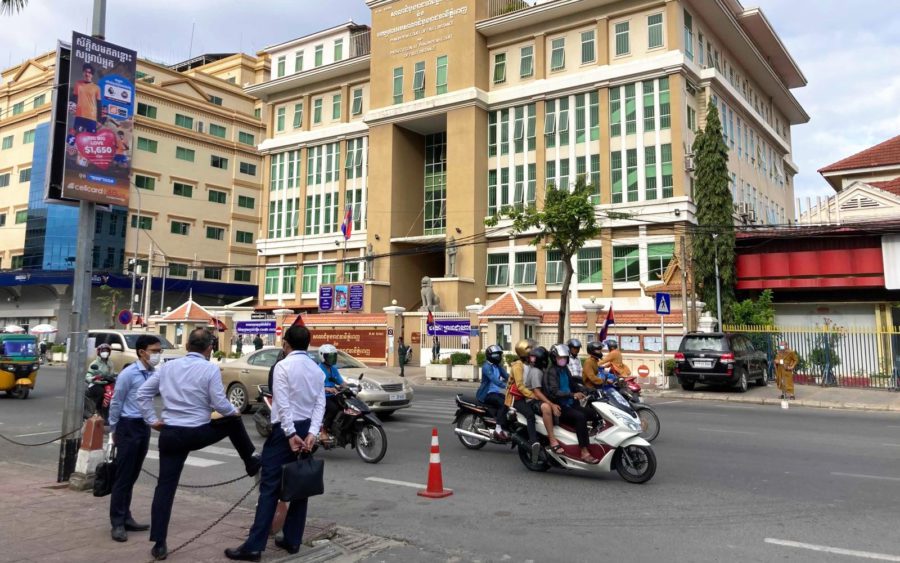At the latest CNRP mass trial hearing, where no summoned defendants were present, the prosecution denied that overseas opposition officials were blocked from participating as they could give up their foreign nationalities and be deported back to Cambodia.
On Thursday, the Phnom Penh Municipal Court continued the trial into case number 887, which involves 21 defendants including CNRP leaders and supporters. The case, one of four that form “mass trials” against the CNRP, is related to the creation of the overseas Cambodia National Rescue Movement in 2018 and critical comments made by former CNRP officials about the Covid-19 pandemic.
However, the hearing lasted only 30 minutes, and none of the accused scheduled to be questioned were present for questioning. Jailed defendants were present, though it was not their turn for questioning.
Seven of the eight defendants scheduled to be questioned were all senior CNRP leaders: co-founder Sam Rainsy, his wife Tioulong Saumura, vice presidents Mu Sochua and Eng Chhai Eang, and former lawmakers Tok Vanchan, Ho Vann and Nut Romduol. They are all overseas.
Defense lawyer Sam Sokong told the court that some of his clients have not received summonses, and even if they wanted to come, they would not be able to since authorities have blocked them from returning to the country.
The government had cancelled the passports for at least 39 former CNRP members, including Mu Sochua, Eng Chhai Eang and Ho Vann.
Deputy prosecutor Seng Heang rejected this argument, however, saying there were many ways they could return to the country if they really wanted.
He said: “If they give up their foreign nationality, authorities [of those countries] will send them back.”
Defense lawyer Sokong said in a message after the hearing that his overseas clients had previously asked for intervention from Cambodian authorities to let them back into the country to attend the trials, but were denied.
“The accused has the right to be present during trial and public hearings. So if they have not attended a trial, the trial is not in line with international standards for a fair trial. They’ve lost their right to attend the trial. They feel the verdict will be unacceptable and unjust.”
The eighth defendant, Hin Chhan, was in the country but ill at home in Svay Rieng. During Thursday’s hearing, presiding judge Ros Piseth asked the court clerk to read out Chhan’s responses under questioning during the investigation period of the case.
Chhan, a former district councilor for Romeas Hek, said in the provided testimony that he had joined the Human Rights Party in 2008 and continued with the CNRP in 2012 when the HRP merged with the Sam Rainsy Party.
He admitted that he had spoken with another defendant, Yim Sareth, about collecting former members about taking their positions back. Chhan had said he was told by a brother who worked at the Interior Ministry that the CNRP might be reinstated.
He added he was told by Mao Vibol, executive party chief in Svay Rieng, to collect members to welcome Rainsy upon his planned — and failed — return.
In his testimony, Chhan said he had also talked on phone with Sareth about Covid-19 and criticized Prime Minister Hun Sen for bringing Chinese nationals and Covid-19 to Cambodia.
In his testimony, he accepted evidence that he had said: “In the Pol Pot era, [people] died of no food, while in Hun Sen’s era, [people] die of Covid-19.”
Chhan admitted that his comments about Covid-19 affected social security and caused chaos in society, but said he had only spoken the words to Sareth.
He pleaded guilty and apologized to Hun Sen.
Defense lawyer Yung Phanit took the opportunity to ask a few questions of Sareth, who is in jail and was in the courtroom.
Sareth acknowledged that he had spoken with Chhan.
Chhun Bunchhat, who is also in jail as part of the case, said on Thursday he was the Interior Ministry official referred to in Chhan’s testimony, but denied he had spoken of politics with Chhan.
“I have never talked about any political issues with him. He was joking with Yim Sareth. … When he was asked where he got this information, he answered to make others believe him, but I did not talk with him at all.”
The next hearing is scheduled for December 23, when the court is expected to question police and look into evidence.













